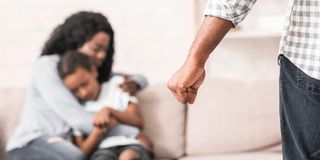Premium
Family curse or unhealed traumas?

Trauma can be healed, and the cycles of trauma permanently broken.
Every time I talk about experiencing sexual molestation as a child, someone calls me and asks me to shush about it. “It happened a long time ago, let it go, forget it.” “No, it continues to happen today, even this second, a child somewhere is being molested.” I fight back. You must too.
A recent survey by the Ministry of Labour and Social Protection, titled Violence Against Children Survey VACS) found that half of the Kenyan children experience violence. That means, when you see two children together, one of them is being abused, physically, emotionally, or even sexually. That is a staggering statistic. Girls experience more sexual violence than boys, but we should not downplay the boys’ abuse, because it is kept more secretive, with the child being shamed and stigmatised.
However much we want to keep traumatic experiences as top secrets, trauma has a character of its own. It comes with pain. Pain begs to be felt. Trauma presents itself in different ways, primarily destructive to self and others. Children bear the brunt of trauma because they are easy targets to vent on. Wives too, because it is easy for a man to physically beat up his wife and get away with it, here in Kenya. Do you know why we have such angry people in our society today? No, it's not the government, though our policy designers have created conducive environments that ensure we experience trauma triggers every day, left, right and centre. We read of children being abused in schools, beaten black and blue by a teacher, and we move on. “It happened to us, and we turned out alright.” No, you did not turn out well. If anything, you are so traumatised that you do not realise how badly you bleed on those around you.
We have angry people because the insidious nature of trauma is that it is transferable, like an inheritance, or a family heirloom. It is passed on like a baton. Until and unless someone in the family decides to heal and break the cycle, trauma keeps manifesting itself, taking all shapes and forms and crippling generation after generation. Before long, we hear statements like, “That family is violent. That family, their daughters ran away from marriages, or that family, the sons cannot keep a wife.” Intergenerational trauma refers to the way trauma, and unresolved psychological wounds are passed down through generations. This is not done through witchcraft, a curse or other spiritual rituals, but through human behaviour, copied, pasted, internalised, and socialised.
Humans are very good at abdicating responsibility and running away from taking accountability. We want to take praise for the good deeds, but we blame the Devil for our bad choices and intentions. Most of the time, the Devil is very busy roaming elsewhere and is utterly stunned when you call his name and point to something you did. What we call family curses are the effect of intergenerational traumas. Children who witness or experience domestic violence will seek partners who are eerily familiar to their parents in behaviour, and in turn, end up perpetuating the violence or being victims of the same.
While there are exceptions to the rule, patterns of our marriages and parenting are a replica of how our parents treated us, and each other. Parents who have suffered trauma develop coping mechanisms that shape their parenting. If a parent is emotionally unavailable, overly critical, or struggles with anxiety, their children absorb these behaviours as normal. This can create cycles of dysfunction, where children repeat the same unhealthy patterns in their own relationships.
Silence and secrecy do not erase trauma but fester it. Children and grandchildren pick up on unaddressed grief and fear, internalising emotions they do not fully understand. Trauma causes an emotional wound, which takes the same pattern as a physical wound. As long as it remains unattended, it continues to hurt, fester, and poison the rest of the body. It becomes a septic and stinky wound until the person either loses a limb or life. In the case of a heart wound, a person loses their identity, purpose and joy. People keep away from them, because of their anger bursts and violence.
Trauma can be healed, and the cycles of trauma permanently broken. Healing a wound is a painful process because it means squeezing out the pus until the infection is cleared of bacteria. But wouldn’t you rather heal than bleed on others and perpetuate ‘family curses’?


